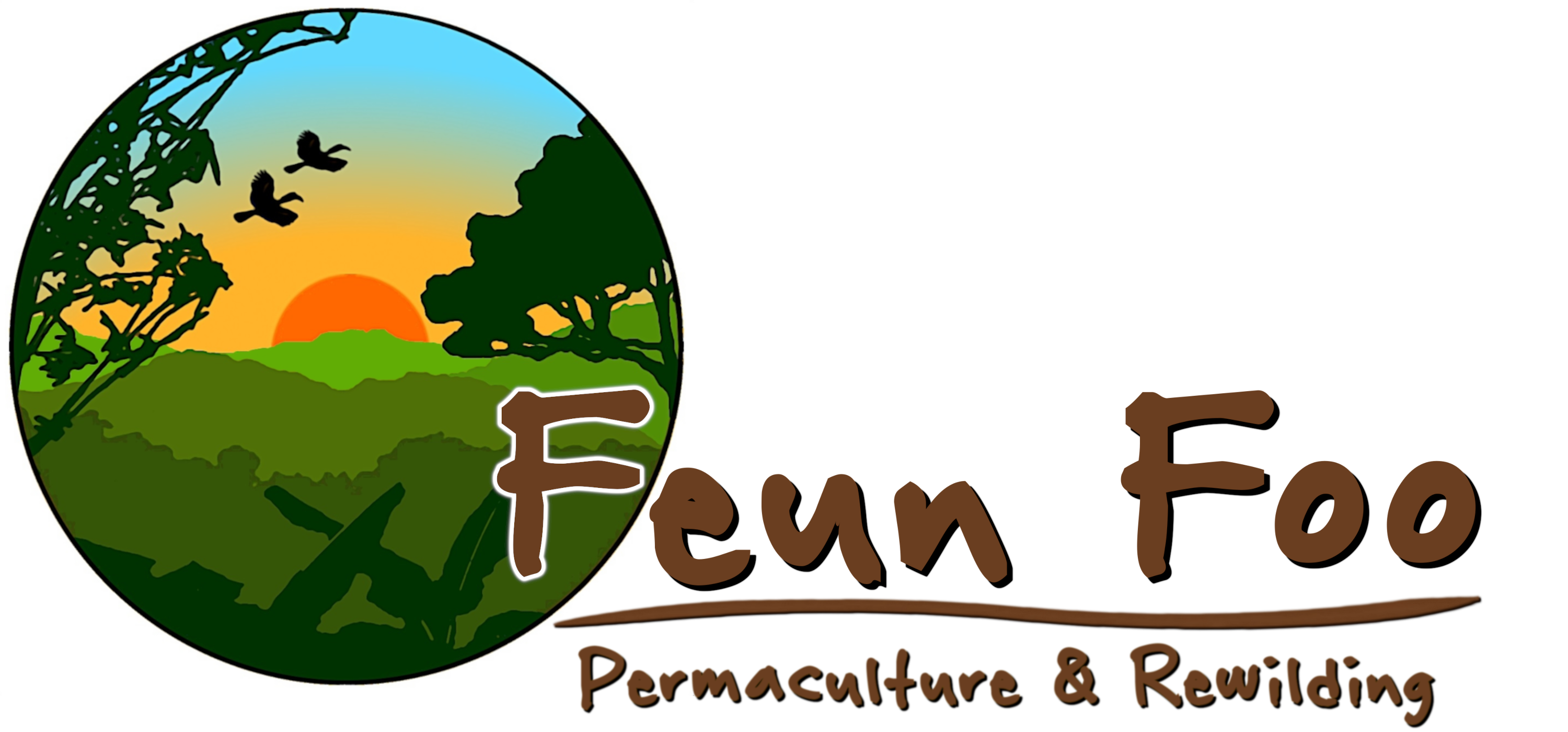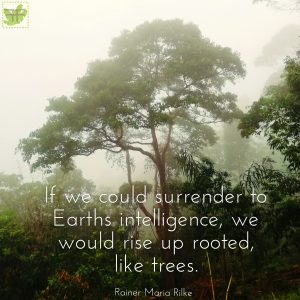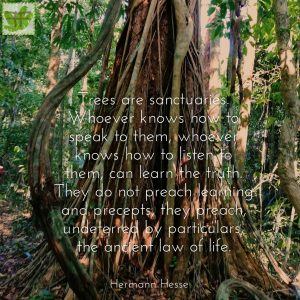Every living being naturally obtains food from its immediate environment. It follows that the best, the natural diet has to be locally sourced food.
We animals all have a diet that highly depends on natural cycles and seasons. Only civilization allows us humans to have tomatoes, cucumbers, salad, and tropical fruit all year round – at a tremendously high cost for the environment. Shipping food from continent to continent is a morally indefensible practice, yet most modern humans can’t do away with this “luxury” anymore. But, as Bill Mollison said:
“Today’s luxuries are tomorrow’s disasters.”
Any diet that relies on global, international and even interregional transport can not be sustainable because it relies on the same old system of fossil fuels and other non-renewable resources, machines, combustion engines, power lines, factories, refineries, smelteries, mines etc. (if you don’t use an ox cart, that is).
Further, it’s more difficult to be spiritually connected to your land if it doesn’t also feed you (and you therefore depend on it with your very life). This bond is fundamental for spiritual wellbeing and to avoid feeling isolated, alienated and purposelessness, and one of the reasons why primitive people often defend(ed) their land with their lives. Without their land, they will die.
Yanomami shaman and indigenous rights activist Davi Kopenawa said of the land he and his people inhabit:
“I know now that our ancestors inhabited this forest from the beginning of time and that they left it for us to live in after them. They never mistreated it. Its trees are beautiful and its soil fertile. The wind and the rain keep it cool. We eat its game, its fish, the fruit of its trees, and its wild honeys. We drink the waters from its rivers. Its humidity makes the banana plants, the manioc, the sugarcane, and everything we plant in our gardens grow. We travel through it to go to the reahu fests we are invited to. We lead our hunting and gathering expeditions along its many trails. The spirits live in it and play all around us. Omama [the god who created sky, the rivers, the forest and its inhabitants] created this land and brought us to existence here. He planted the mountains to hold the ground in place and turned them into the houses of the xapiri [spirits], whom he left to take care of us. It is our land and these are true words.”
Lejeng Kusin, an elderly woman of the Ubong River Penan in Maysia, found moving words to describe their dependence on and connection to the land:
“And if this forest were cut down, if this place were ruined by logging, they wouldn’t need to send two or three people here to assault us and kill is. They could send just one person, and he would be strong enough to kill as all for sure. Because we are not used to seeing open spaces, we are not used to seeing trees that have been felled and destroyed. Because there would be nothing left to make us want to live, because the trees we yearn for would have been destroyed. And if they were to say that we were happy, happy in this place after it is logged, it would really mean that they do not want us to live. They do not want us to be happy. They want to assault us and kill us. Surely we don’t feel happy or proud about the logging because all these bulldozers, all this logging, is harmful to us. This is our problem, this is our difficulty. We can never be happy living on red ground. And we always feel sad and troubled. When we look at the forest that has been destroyed, we feel the way one feels after not having eaten for a long time. We yearn for the sounds of the forest. We have always heard these sounds. In the time of our grandparents long ago we heard these sounds. That is why we still yearn to hear them. In those times long ago, our lives were satisfying, our lives were fulfilled. And now it is harder for us, because we hear the sound of bulldozers. And that is what we always talk about, we women, when we get together. How will we live, how will we thrive, now that we have all these new problems? To us the sound of bulldozers is the sound of death. We feel sorrowful, we weep, when we see the forest has been destroyed, when we see the red land. It is hard for us to look at the red land.”
The point here is, if you depend on your landbase to feed you, you will automatically treat it right and with the appropriate respect, and defend it against threats. It’s a matter of life over death to not destroy your environment. Eating local is therefore an act of forging this ancient bond, of reconnecting, and it reinforces conservation and stewardship of – and responsibility for – the land.
If you eat what your land offers you in abundance, there is also no need to constantly ponder what you should and shouldn’t eat. As we’ve said before: listen to your land, and it will tell you what to eat.
When we get hungry and don’t know what to cook, we take a walk through our garden and see what it gifts us with today – the gathered ingredients will be what we eat on that day. If the bamboo starts shooting out of the ground at the beginning of rainy season, we make bamboo shoots our staple for weeks at a time. If, in fruit season, there are plenty of squirrels taking their share of the harvest, we might shoot one if an opportunity opens up. If there are plenty of insects buzzing about, we might collect some to eat them.
Sources:
The Falling Sky – Words of a Yanomami Shaman; Davi Kopenawa (Harvard University Press, 2013)*
Nomads of the Dawn – The Penan of the Borneo Rain Forest; Wade Davis, Ian Mckenzie, Shane Kennedy (Pomegranate, 1995)




















![[English version below]
ช่วงนี้ลูกเนยถั่วออกเยอะมากๆเก็บกินแทบไม่ทัน😅
นี่เก็บจากต้นเดียวเอง เป็นผลไม้จากทวีปอเมริกาใต้อีกชนิดหนึ่งที่เรามีในสวน กินอร่อยจริง รสชาติสมชื่อ คือเหมือนกินเมล็ดถั่วกับเนยในลูกเดียว ต้นนี้ปลูกง่าย โตเร็ว ชอบอากาศร้อนชื้นและแห้งแล้ง ลูกสุกเปลี่ยนสีเป็นสีแดงตามรูปเลย เนื้อนุ่มเคี้ยวละมุนในปากแต่เนื้อค่อนข้างติดเมล็ด😋 ปลูกแค่2-3ปีก็ออกลูกให้กินแล้วเผลอๆอาจจะแค่ปีกว่าๆก็ออกลูกได้แล้ว ถ้าขยันดูแลดีเป็นพิเศษ😅 ตอนที่นั่งกินทำให้มีความรู้สึกเหมือนกำลังกินขนมหรือลูกอม เพราะกินสนุก กินอร่อยๆ และปลอดภัยต่อสุขภาพแบบเกินร้อยถ้าเทียบกับขนมตัวจริง😅 เด็กๆกินได้ผู้ใหญ่ก็กินได้ต้นนี้เลย ต้นเนยถั่ว😋
ปล. หากท่านใดสนใจอยากได้เมล็ดพันธุ์ติดต่อสวนเราได้จ้า😍 มีเยอะคะช่วงนี้😀 เราจัดส่งเมล็ดให้ฟรีๆเพียงแค่คุณต้องจ่ายค่าส่งเองเท่านั้น อยากได้เมล็ดเม้นท์ใต้โพสต์หรือส่งข้อความหาเราได้เลยคะ😍
The peanut butter tree gifts us generously this year - after only three years, we finally harvest enough to eat as much as we would like to. We spread the seeds by throwing handfuls around in the upper half of the garden, and since they sprout pretty easily we will have plenty more in the years to come, and there's gonna be plenty of leftovers for the birds as well (who also really enjoy peanut butter fruit, but only occasionally get to eat a fruit we missed) 😊
#permaculture #peanutbutterfruit #healthysnack #slowfood #junglelife](https://scontent-sin6-4.cdninstagram.com/v/t51.29350-15/283300740_155802276938680_7664917016698200906_n.webp?stp=dst-jpg&_nc_cat=101&ccb=1-7&_nc_sid=8ae9d6&_nc_ohc=fWTX5D0N1VUAX9Wlb-G&_nc_ht=scontent-sin6-4.cdninstagram.com&edm=ANo9K5cEAAAA&oh=00_AT-NxLhSMBjV6-esVM29Z7t4UHCbZjoFcBYeowWnf2IdIg&oe=628F14D4)
![[English version below]
ช่วงนี้ลูกเนยถั่วออกเยอะมากๆเก็บกินแทบไม่ทัน😅
นี่เก็บจากต้นเดียวเอง เป็นผลไม้จากทวีปอเมริกาใต้อีกชนิดหนึ่งที่เรามีในสวน กินอร่อยจริง รสชาติสมชื่อ คือเหมือนกินเมล็ดถั่วกับเนยในลูกเดียว ต้นนี้ปลูกง่าย โตเร็ว ชอบอากาศร้อนชื้นและแห้งแล้ง ลูกสุกเปลี่ยนสีเป็นสีแดงตามรูปเลย เนื้อนุ่มเคี้ยวละมุนในปากแต่เนื้อค่อนข้างติดเมล็ด😋 ปลูกแค่2-3ปีก็ออกลูกให้กินแล้วเผลอๆอาจจะแค่ปีกว่าๆก็ออกลูกได้แล้ว ถ้าขยันดูแลดีเป็นพิเศษ😅 ตอนที่นั่งกินทำให้มีความรู้สึกเหมือนกำลังกินขนมหรือลูกอม เพราะกินสนุก กินอร่อยๆ และปลอดภัยต่อสุขภาพแบบเกินร้อยถ้าเทียบกับขนมตัวจริง😅 เด็กๆกินได้ผู้ใหญ่ก็กินได้ต้นนี้เลย ต้นเนยถั่ว😋
ปล. หากท่านใดสนใจอยากได้เมล็ดพันธุ์ติดต่อสวนเราได้จ้า😍 มีเยอะคะช่วงนี้😀 เราจัดส่งเมล็ดให้ฟรีๆเพียงแค่คุณต้องจ่ายค่าส่งเองเท่านั้น อยากได้เมล็ดเม้นท์ใต้โพสต์หรือส่งข้อความหาเราได้เลยคะ😍
The peanut butter tree gifts us generously this year - after only three years, we finally harvest enough to eat as much as we would like to. We spread the seeds by throwing handfuls around in the upper half of the garden, and since they sprout pretty easily we will have plenty more in the years to come, and there's gonna be plenty of leftovers for the birds as well (who also really enjoy peanut butter fruit, but only occasionally get to eat a fruit we missed) 😊
#permaculture #peanutbutterfruit #healthysnack #slowfood #junglelife](https://scontent-sin6-1.cdninstagram.com/v/t51.29350-15/281748280_711057433442587_7897669658700971285_n.webp?stp=dst-jpg&_nc_cat=111&ccb=1-7&_nc_sid=8ae9d6&_nc_ohc=5Wgi4EpwkV0AX8FBOiS&_nc_ht=scontent-sin6-1.cdninstagram.com&edm=ANo9K5cEAAAA&oh=00_AT8ex-gNO2q9J-QODVZZWxwSI6bqpMjqDd1Qr1Ji7mQ3Hw&oe=62906D82)
![[English version below]
ช่วงนี้ลูกเนยถั่วออกเยอะมากๆเก็บกินแทบไม่ทัน😅
นี่เก็บจากต้นเดียวเอง เป็นผลไม้จากทวีปอเมริกาใต้อีกชนิดหนึ่งที่เรามีในสวน กินอร่อยจริง รสชาติสมชื่อ คือเหมือนกินเมล็ดถั่วกับเนยในลูกเดียว ต้นนี้ปลูกง่าย โตเร็ว ชอบอากาศร้อนชื้นและแห้งแล้ง ลูกสุกเปลี่ยนสีเป็นสีแดงตามรูปเลย เนื้อนุ่มเคี้ยวละมุนในปากแต่เนื้อค่อนข้างติดเมล็ด😋 ปลูกแค่2-3ปีก็ออกลูกให้กินแล้วเผลอๆอาจจะแค่ปีกว่าๆก็ออกลูกได้แล้ว ถ้าขยันดูแลดีเป็นพิเศษ😅 ตอนที่นั่งกินทำให้มีความรู้สึกเหมือนกำลังกินขนมหรือลูกอม เพราะกินสนุก กินอร่อยๆ และปลอดภัยต่อสุขภาพแบบเกินร้อยถ้าเทียบกับขนมตัวจริง😅 เด็กๆกินได้ผู้ใหญ่ก็กินได้ต้นนี้เลย ต้นเนยถั่ว😋
ปล. หากท่านใดสนใจอยากได้เมล็ดพันธุ์ติดต่อสวนเราได้จ้า😍 มีเยอะคะช่วงนี้😀 เราจัดส่งเมล็ดให้ฟรีๆเพียงแค่คุณต้องจ่ายค่าส่งเองเท่านั้น อยากได้เมล็ดเม้นท์ใต้โพสต์หรือส่งข้อความหาเราได้เลยคะ😍
The peanut butter tree gifts us generously this year - after only three years, we finally harvest enough to eat as much as we would like to. We spread the seeds by throwing handfuls around in the upper half of the garden, and since they sprout pretty easily we will have plenty more in the years to come, and there's gonna be plenty of leftovers for the birds as well (who also really enjoy peanut butter fruit, but only occasionally get to eat a fruit we missed) 😊
#permaculture #peanutbutterfruit #healthysnack #slowfood #junglelife](https://scontent-sin6-3.cdninstagram.com/v/t51.29350-15/281872908_168143295660521_2987194449941779810_n.webp?stp=dst-jpg&_nc_cat=106&ccb=1-7&_nc_sid=8ae9d6&_nc_ohc=GK8ricbSfgIAX8ZbpMH&_nc_ht=scontent-sin6-3.cdninstagram.com&edm=ANo9K5cEAAAA&oh=00_AT8nW1-qCG5_lEoJuLeeMxsi9mh5yYVuZI-qlgv86RVIgA&oe=628F1714)
![[English version below]
จำปาดะ (ผลไม้อีกชนิดหนึ่งในตระกูลขนุน) ต้นนี้ที่อยู่ข้างบ้านของเรา ออกดอกติดผลให้กินมากขึ้นในแต่ล่ะปี ตอนนี้ต้นกำลังออกดอก แต่ดูเหมือนว่าจำปาดะจะติดเยอะมากปีนี้ (เย่) อยากกินแล้วน๊า!! 😋
The cempedak tree besides our house gifts us with more and more abundance each year - she just started flowering, but it already looks like it's gonna be a good year for cempedak! Can't wait!!
#cempedak #artocarpus #abundance #foodjungle #permaculture #junglelife #subsistencefarming](https://feunfoo.org/wp-content/uploads/2022/02/273890094_1026327931566679_2121004513380987491_n.jpg)
![[English version below]
มะวานที่พวกเราเราขึ้นไปเอาข้าวให้ไก่และดูพระอาทิตย์ตก พอดีถือโทรศัพท์ติดตัวไปด้วย และนี่ก็คือวิวยามเย็นสวยสุดๆที่ได้เห็นกัน! เหตุที่หมอกทั้งหนาและสูงถึงเพียงนี้ก็คือ ฝนตกทั้งวันแล้วก็หยุดตกก่อนจะมืดค่ำ มันแปลกมากๆ เพราะนี่มันกำลังจะเข้าฤดูร้อนแล้ว แต่มันเป็นเรื่องดีมากสำหรับพืชสวน ต้นไม้ต่างก็มีความสุขกัน พวกเราเองก็ไม่ต้องรดน้ำผักไปอีกอาทิตย์หนึ่งเลยทีเดียว!
ช่วงไม่กี่เดือนมานี้อาจจะไม่ค่อยเห็นพวกเราอัพเดตเรื่องราวของสวนลงในสังคมอออนไลน์เท่าไหร่ มีเหตุผลอยู่ว่า ไม่อยากจะพกพาโทรศัพท์ติดตัวตลอดและอยากจะสนุกเพลิดเพลินไปกับสิ่งที่พวกเราทำกัน แทนที่จะมัวขบคิดว่ามันจะดูยังไงในรูปถ่าย แต่ยังไงพวกเราก็คงจะมาอัตเดตกันบ่อยขึ้นหลังจากนี้ ถ้ามีเวลาและแรงบันดาลใจ😄
Yesterday we finally had our phone with us again when we went to feed the chicken/watch the sunset, and this is what we were rewarded with! It rained the whole day and just cleared up before dusk - very strange, considering that it's dry season. Well, the garden loves it, the trees are happy, and we don't have to water our vegetables for at least another week!
We've been rather quiet on social media for the past few months, for no particular reason other than that we don't want to carry around our phone all the time, and just enjoy things instead of thinking how they would look like on camera 😀 Call it a partial digital detox! 😁 Well, maybe from now on we'll post more regularly, if we find the time and motivation 😜
#slowlife #sunset #permaculture #hillpeople
#junglelife #panorama #foodjungle](https://feunfoo.org/wp-content/uploads/2022/02/273822326_165241689169172_8620684220343524182_n.jpg)



No comments.